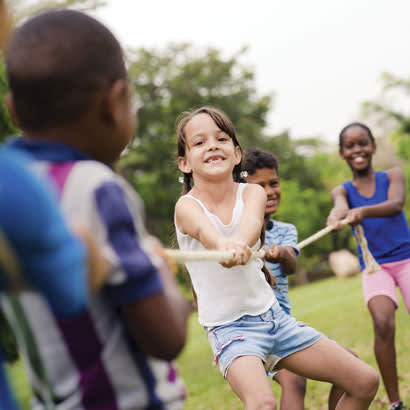
Digging in the sand. Pumping your legs on the swing set. Climbing across monkey bars. Playing stickball in the park, street hockey in the cul-de-sac or manhunt in the woods. Many young professionals, like me, have fond memories of these playful activities from our childhood. Those times spent exploring the playground taught us about the neighborhood around us and how our bodies moved, balanced, jumped and ran. Playing pick-up sports with neighbors and friends taught us conflict resolution when an all-but-expected ruling disagreement arose. We also learned about our emotions, how to meet new people and how to interact with a group. The time we spent playing taught our generation a lot of things that can’t necessarily be learned in a classroom.
Today’s young professionals are unique, in that we were fortunate enough to experience play — and more importantly, free play. However, we also were among the first to be highly scrutinized with standardized testing, to experience an increase in the competitive nature of recreational sports and to have easy access to video games. We lived a childhood that was like the “old days” when it came to play — the only rule was to come home before the street lights came on — but we were also exposed to the changing social and societal norms that children are accustomed to today.
Perfect Advocates for Play
Instead of being free to play, today’s children are immersed in a competitive world from a very early age. Between highly structured and overly competitive youth sports and constant high-stakes standardized testing at schools, children have little time to be kids.
Play built our imaginations and our creativity, helped us make friends and resolve conflicts and disagreements, gave us exercise and helped our bodies grow. Play made us happy, and we should want today’s children to have playful childhood memories like the one we experienced. Every child has a right to play. In today’s stressed-out world where childhood anxiety is on the rise, children need downtime to engage in free play.
That’s where we, as young professionals, need to step in. We need to promote the value of play to our communities. Children look up to young adults and people of our generation, so when we organize and implement programs, we need to be role models for play.
Fortunately, park and recreation professionals, and especially young professionals, are a perfect group to advocate for play. We understand the benefits, have the resources to form play groups and programs and, most importantly, want our residents and children to use our parks and facilities and be playful in them.
Examples of Play-Oriented Programming
There are many projects and programs we can undertake to make play a priority in every community. A major concern for parents — and rightfully so — is their child’s safety. While past generations were free to roam the playground without adult supervision, parents today feel safer supervising their child constantly (sometimes to the point of being “helicopter” parents). The 24/7 media reports and access to news at our fingertips on our smartphones make us believe that the world is a less safe place, even though, according to the FBI, as reported in an April 14, 2015, The Washington Post Wonkblog, titled “There’s never been a safer time to be a kid in America,” crime has decreased since 1997.
To help alleviate these concerns, recreation departments can host Playground Days, where there will be trained staff supervising children. This allows children to get the free play they need, with the supervision parents expect.
A second approach a recreation department can implement is a “Play Ambassador” or “Playologist” program. These programs teach high-school-age students about the benefits of play and fun games for younger children to play. Then, as a play ambassador or playologist, they can help run programs and play events for children and help energize them with playful activities.
A third program is creating a town-wide scavenger hunt. For example, departments can distribute a list of tasks for each family to do at one of their parks, take a picture of it, and have families send their pictures to the department. This can be a wonderful way for residents to explore all aspects of the parks. Sometimes, residents are unaware of a certain park or its amenities. A scavenger hunt is a low-cost, low-overhead program to encourage families to explore the parks and play spaces in their community.
As young professionals, we need to work to increase awareness about the importance of free play to get support from parents, schools and recreation committees (or commissions, advisory boards, etc.), and elected officials. Because we fondly remember our time playing and know how it helped us grow, we need to take the lead in advocating for more time, more space and more opportunity for children to play.
Ralph Waldo Emerson said, “It is a happy talent to know how to play.” We need to work to ensure that play, as we know it, does not disappear. Play is a talent every child has. It’s our job to have that talent shine in every child.
Brian VanDongen, CPRP, is the Assistant Director for the Readington Recreation Department.

